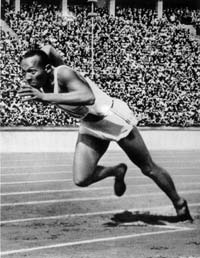Home > Sports > Athens 2004 > Features
Olympic Legends: Jesse Owens
August 10, 2004
Jesse Owens was the man who exposed the malign Nazi myths of Ayran racial supremacy in an Olympic Games in Berlin saturated by the politics which were soon to start a global war. During three-quarters of an hour on May 25, 1935, Jesse Owens broke five world records and equalled a sixth.
 In the following year he won four gold medals in the space of six days at the Berlin Olympics.
In the following year he won four gold medals in the space of six days at the Berlin Olympics.
Owens had emerged from desperate poverty and returned to the United States after the Games to find sporting fame guaranteed nothing for the son of a black sharecropper.
The Nazis had mocked the United States for picking "black auxiliaries". They were silenced by Owens who won the 100, 200, long jump and anchored the 4x100 metres relay team to victory.
The long jump competition afforded an enduring image of individuals surmounting ideologies.
Blond-haired, blue-eyed German Luz Long helped Owens qualify by suggesting he jump well behind the take-off board to avoid a no-jump. Beaten into second place in the final Long embraced Owens in sight of glowering Nazi leader Adolf Hitler.
The pair of athletes struck up a friendship which ended only when Long was killed in battle in 1943.
As a small boy, one of 13 children, three who died at birth, Owens worked long days picking cotton in Alabama.
Named James Cleveland he was known as Jesse after a teacher misheard him when he gave his initials J.C. on enrolment at Bolton Elementary School when the family had moved to Cleveland.
RARE TALENT
 | Olympic Legends |  | |
|
Owens was a rare natural talent. Just how rare was demonstrated on that May day in 1935.Starting at 3.15 p.m. at Ferry Field in Ann Arbor, Michigan and running for the Ohio State team, Owens equalled the world record for the 100 yards with 9.4 seconds.
He gathered three more world records (8.13 metres in the long jump, 20.3 seconds in the 220 yards and 22.6 in the 220 yards hurdles).
He was also credited with world marks for the 200 metres and 200 metres hurdles, broken en route to his imperial marks.
After his Berlin triumphs, Owens found the American establishment did not want to know. Despite ticker tape parades in New York and Cleveland, President Franklin Delano Roosevelt declined to invite him to the White House.
He turned professional and made early money from an unexpected source -- Roosevelt's Republican opponent Alf Landon who ended up winning only two states in the 1936 presidential election.
In December of the same year, Owens earned $2,000 for defeating a horse in a footrace in Havana, toured with a circus basketball team called the Indianpolis Clowns and sang (badly by all accounts) for a dance band.
Owens eventually prospered as a speechmaker for corporate sponsors, preaching predictably optimistic messages. He died of lung cancer in 1980.